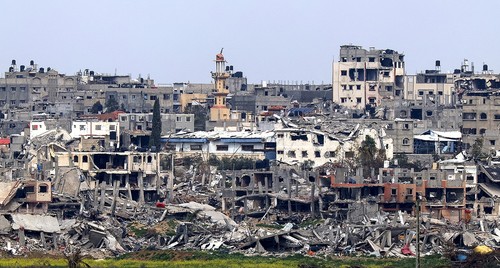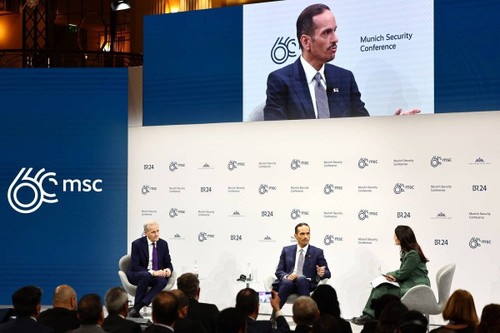 Devastated buildings in the Gaza Strip, photo taken on February 16, 2024 (Photo: AFP) Devastated buildings in the Gaza Strip, photo taken on February 16, 2024 (Photo: AFP) |
Four months after fighting between Israel and Hamas in the Gaza Strip broke out, hopes for a long-term ceasefire dimmed after diplomatic negotiations in Cairo ended in deadlock.
Dead-end diplomacy
On February 18, Qatar's Prime Minister and Foreign Minister Sheikh Mohammed Bin Abdulrahman Al Thani told the Munich Security Forum that diplomatic efforts to reach a ceasefire agreement between Israel and Hamas are at a dead end after nearly three weeks of intensive negotiations.
Together with the US and Egypt, Qatar is one of the sponsors of an agreement under which Hamas would release Israeli hostages in exchange for Palestinian prisoners and a long-term ceasefire. Thin hopes of reaching an agreement were rekindled when representatives of the parties involved in the conflict and top security officials of the US, Qatar, and a number of Middle Eastern countries met in Cairo last week. But on February 13 they ended negotiations without achieving any progress.
 Qatar's Prime Minister and Foreign Minister Sheikh Mohammed Bin Abdulrahman Al Thani joins a discusion on the sideline of the Munich Security Forum in Germany on February 17th, 2024. (photo: EPA/Anna Szilagyi) Qatar's Prime Minister and Foreign Minister Sheikh Mohammed Bin Abdulrahman Al Thani joins a discusion on the sideline of the Munich Security Forum in Germany on February 17th, 2024. (photo: EPA/Anna Szilagyi) |
Prime Minister Al Thani said, “I think the time is not in our favor. We made some good progress in the past three weeks in the negotiations and we have been trying to reach an agreement between the two parties, but the last few days did not progress as expected. There are still differences between the two parties.”
Al Thani said recent negotiations focused on two things: opening a humanitarian corridor in the Gaza Strip and the number of Palestinian prisoners to be released in exchange for the hostages held by Hamas. Negotiations on the humanitarian issues have progressed, but Israel and Hamas strongly disagree on the number of prisoners to be exchanged.
Israeli Prime Minister Benjamin Netanyahu said on February 17 that no further negotiations will take place until Hamas changes its demands.
“The negotiations require a tough stance. Until this moment, Hamas’s demands have been delusional. They mean only one thing: defeat for Israel. Of course, we will not agree to them. When Hamas drops these delusional demands we can move forward,” said Netanyahu.
The Israeli government also insists on other tough stances, including rejecting a unilateral recognition of an independent Palestinian state and refusing to cancel planned attacks in the southern Gaza town of Rafah.
Last week, a US veto of an Algerian-drafted resolution demanding an immediate humanitarian ceasefire further frustrated diplomatic efforts.
Bigger risk of humanitarian crisis
The international community fears that the humanitarian crisis in the Gaza Strip could spread in the coming weeks. On February 19 the Israeli government announced a planned attack on Rafah in early March if Hamas does not release all hostages.
Rafah, located at the southern end of the Gaza Strip, has become the last refuge for Palestinians who fled the fighting late last year. According to the UN, there are 1.3 to 1.4 million Palestinian civilians sheltering in Rafah, making it the most densely populated city in the world.
The fighting that broke out last October has claimed the lives of 30,000 Palestinian civilians, forced 85% of Gaza’s population – 1.7 million people – to flee their homes, and pushed half a million people to the edge of starvation.
After discussing the Gaza situation with the King of Jordan in Paris on February 16, President Emmanuel Macron of France warned of an unprecedented humanitarian crisis if Israel attacks Rafah.
“The Gaza death toll is intolerable. Several days ago I told Israeli Prime Minister Benjamin Netanyahu that Israel’s attack in Rafah will lead to an unprecedented humanitarian crisis and mark a turning point in the conflict,” said Macron.
A large-scale attack by the Israeli army in Rafah will likely cause hundreds of thousands of Palestinians to flee to Egypt's nearby Sinai Peninsula and create a crisis in Egypt.
On February 18, Egyptian Foreign Minister Sameh Shoukry warned that Egypt considers this a red line that could sever relations between Egypt and Israel and expand violence in the region.